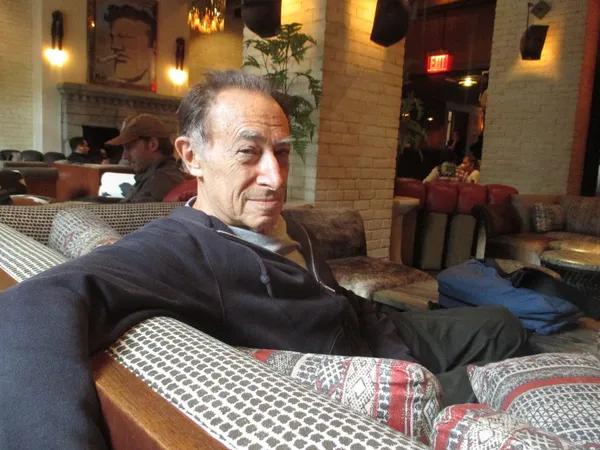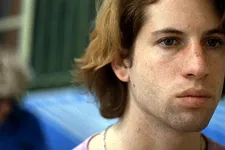The morning before the theatrical release at Metrograph of the 4K restoration of A Bigger Splash, director/cinematographer Jack Hazan met with me for a conversation at the Ludlow Hotel. We discussed the initial influence of Bernardo Bertolucci's Last Tango In Paris and where Marlon Brando is for him, Michelangelo Antonioni's L'Eclisse, L'Avventura and Blow-Up, Robert Bolt, Joe Strummer of The Clash in Rude Boy, David Hockney and synaesthesia, and a surprising shower scene that Jack Hazan calls an antidote to Alfred Hitchcock's Psycho.
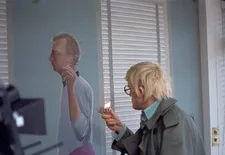 |
| David Hockney illuminates his Patrick Procktor portrait |
A Bigger Splash, co-written with editor David Mingay, captures a version of David Hockney's life in the early Seventies through the appearances of Celia Birtwell, Ossie Clark, Henry Geldzahler, John Kasmin, Patrick Procktor, Peter Schlesinger, and the artist at work.
Anne-Katrin Titze: It was wonderful seeing your film.
Jack Hazan: First time you've seen it?
AKT: Yes, first time. I had heard about it but never got to see it until the restoration. 45 years have passed, how is it for you seeing it now?
JH: I mean, I've been watching it over the years. Of course when we made it, I saw it thousands of times in the cutting room, so it's just very familiar.
AKT: It does make a difference, though, I suppose, to know that you're showing it to a public who is discovering it for the first time?
JH: There's a massive difference between 1974 when it showed at the New York Film Festival and now. They were hostile to it in 1974. First of all, they didn't like the gay ambiance or the gay subject matter. And also the genre. They couldn't understand it. What is this? A documentary or a feature film? Notwithstanding that I'd say to them: What does it matter? It did matter. Which in Europe it didn't matter. It was quite a contrast. I came away quite wounded, I must say.
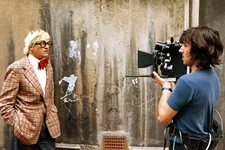 |
| Jack Hazan on filming David Hockney in A Bigger Splash: "When we made it it was a collaborative affair between myself and my artistic partner David Mingay. He's an editor and I'm a cameraman." |
AKT: Now comes the healing, after 45 years?
JH: Well, the healing is taking place now. It's a little bit late. 45 years to heal? You must be joking. It was terrible. It was an innovation in a way.
AKT: Ahead of its time.
JH: I think it probably was, yeah. When we made it it was a collaborative affair between myself and my artistic partner David Mingay. He's an editor and I'm a cameraman. We put it together and it seemed totally natural.
AKT: You didn't think about the genre?
JH: No, for us it looked normal, the most logical thing in the world. But when it was put together people didn't necessarily see it that way. In Europe they did. But in the US, no.
AKT: You had made a film on Robert Bolt right before.
JH: Oh my god, yes. That was just a straight documentary. It dropped into our lap and we just did it. Just a very standard documentary. I can barely remember it now.
AKT: Okay, no resurrection of that. Whereas Rude Boy on The Clash is closer to this one in style?
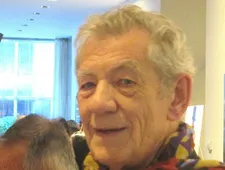 |
| Ian McKellen attended the optics and Vermeer symposium at NYU in 2001 when David Hockney presented Photo: Anne-Katrin Titze |
JH: Rude Boy we did ourselves, the other one on Robert Bolt was a commission. Again, David Mingay, my partner, came up with it. I was rather resistant to it and didn't want to do it. I wasn't really interested in rock music, it wasn't my thing.
And that became an advantage, because Joe Strummer kind of respected me. Because I just thought of rock music as kind of entry level music, whereas I was interested in jazz and classical music. Mostly jazz, I must say, which is of a different level, on a different level.
AKT: It helps sometimes to be an outsider.
JH: It's essential, I believe, not to be completely involved in what you're doing, in the subject matter. To have objective distance, otherwise you don't know what you're doing. If you're too involved, it becomes an illogical obsession.
AKT: I had a conversation with David Hockney when he was doing a symposium here [at NYU] on optics and Vermeer.
JH: Oh yes, that's a while ago, isn't it?
AKT: It was 2001.
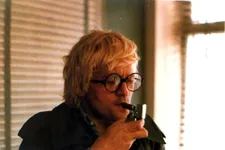 |
| Jack Hazan on David Hockney: "It's very difficult to direct him. But you could say 'Could you just go from there to there?' And he would do it." |
JH: It's stunning, he's just very persuasive, isn't he?
AKT: It was fantastic. It was 2001, here in New York, right after 9/11, just months later. That event brought us back to life and art in a way. [Susan Sontag was on the panel and Ian McKellen was attending.]
JH: Kickstart New York back into life!
AKT: David Hockney invited me to the dress rehearsal for Parade, which he was doing at The Metropolitan Opera. It was so invigorating. There was life. It's something that you captured in your film also - there's so much life in him.
JH: It's very difficult to direct him. But you could say "Could you just go from there to there?" And he would do it. What he wants to do simply was to paint. Because he was so obsessed with painting, he would just let me do what I wanted to do around him.
AKT: What about the shower scene? No big deal?
JH: No, it's no big deal. I just got in with him, you know, we're both naked in the shower. And after he said "Jack, you're mad."
AKT: Interesting shower, though.
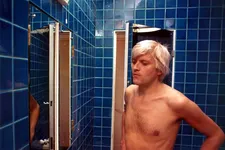 |
| Jack Hazan on the David Hockney shower scene: "This is an antidote to Psycho." |
JH: Oh, fantastic! You see, because we got such hard water in London, all those little jets around were all limed up. It took two or three hours, with a needle I had to prick the limed-up jets. But it was worth it.
AKT: It was worth it. When you think of shower scenes, you think of Psycho. And I'll think of yours now.
JH: Yes, this is an antidote to Psycho.
AKT: I also remember talking to David Hockney about his synaesthesia, which I happen to have as well.
JH: You do? You think in colour?
AKT: Yes, well, the senses are connected. Certain letters have certain colours, for instance.
JH: Same for him?
AKT: Yes, we talked about that. Vladimir Nabokov is another synaesthete. In your film I noticed a little detail, Manolo Blahnik's name on the doorbell.
JH: Oh you saw that? You are incredibly perceptive! It's right at the top of the frame. And every time I see that shot I think, nobody is going to see that!
AKT: I saw it!
JH: He was living above Peter [Schlesinger].
AKT: He didn't want to be in the film or wasn't asked?
JH: I mean, there are lots of people who could have been in the film. I think Wayne Sleep, the dancer, was very upset with me that he wasn't in the movie. He and George, I think his partner at the time. I once went to a party and he just was very insulting.
AKT: What films do you watch now?
JH: I barely watch any films. When I was making that film [A Bigger Splash], one film I did watch was Last Tango in Paris. I went to see that; it was during the same period. I was bowled over. I thought it was amazing. I saw it two years ago, I thought it was terrible. It has this Trotskyist dogma all the way through it. The way they spout Communist ideals etc, it's so phony, it's awful. And Brando is so passé now.
JH: The past came out for him in that movie.
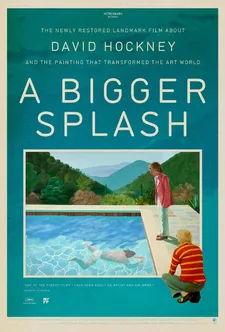 |
| Metrograph Pictures A Bigger Splash 4K restoration poster |
AKT: Did it have an impact on you then, on your film?
JH: Yes it did. I remember I went to bed that night and I had prickles all over my back, I couldn't sleep. Because I knew I was on the right track with this film. Because I could see what I was doing, Bertolucci, the master, had already done. The improvisation in particular, I suppose.
AKT: It is also a breakup film.
JH: It is. They're both breakup films. I had the intelligence to understand that. It wasn't just anybody who made this. It was Bertolucci!
AKT: How can you go wrong with Bertolucci?
JH: I think for me, I should say, the master is not Bertolucci, but Antonioni, for me, is the master.
AKT: Antonioni is the number one for you?
JH: I think, probably. L'Eclisse and L'Avventura. In fact there's a reference to that, to Antonioni. The scene in the park [in A Bigger Splash] when David photographs Peter, it's a reference to Blow-Up. No music over it.
AKT: No tennis.
JH: There's birds tweeting and the same atmosphere as in Blow-Up.
AKT: The painting [Portrait Of An Artist (Pool With Two Figures)] itself that is at the centre of your film A Bigger Splash, sold last winter for $90.3 million at auction.
JH: It's extraordinary! That they're all talking about the painting around which the whole film is centred.
AKT: The most ever for a work of any living artist.
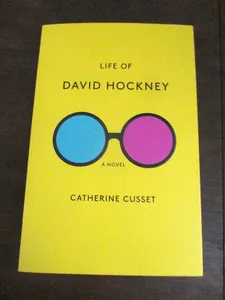 |
| Catherine Cusset's Life Of David Hockney novel (Other Press, 2019) Photo: Anne-Katrin Titze |
JH: It just happened that way. It was as though I designed it that this would be the painting that will be most discussed.
AKT: Were there options then? Why did you pick that one?
JH: That was the picture he was making. It took him six months. He tried to do it for six months and he failed. And then he kind of tore it all up.
AKT: And re-did it in two weeks?
JH: In two weeks. The only reason he did it in two weeks was because I gave him a light with a blue filter to simulate daylight and he could paint 24 hours a day if he wanted. And he did. That's how he managed to complete it within two weeks.
AKT: So you should get a percentage.
JH: Well, he doesn't get a percentage either, don't forget, of the 90 million. It has nothing to do with him.
The 4K restoration of A Bigger Splash is screening at Metrograph in New York.
Friday, June 28 at 9:30pm: An introduction by Jeremy O Harris - Saturday, June 29 at 5:30pm: Q&A with Catherine Cusset and book signing of Life Of David Hockney, a novel - Sunday June 30 at 6:15pm: An introduction by Matt Wolf.








